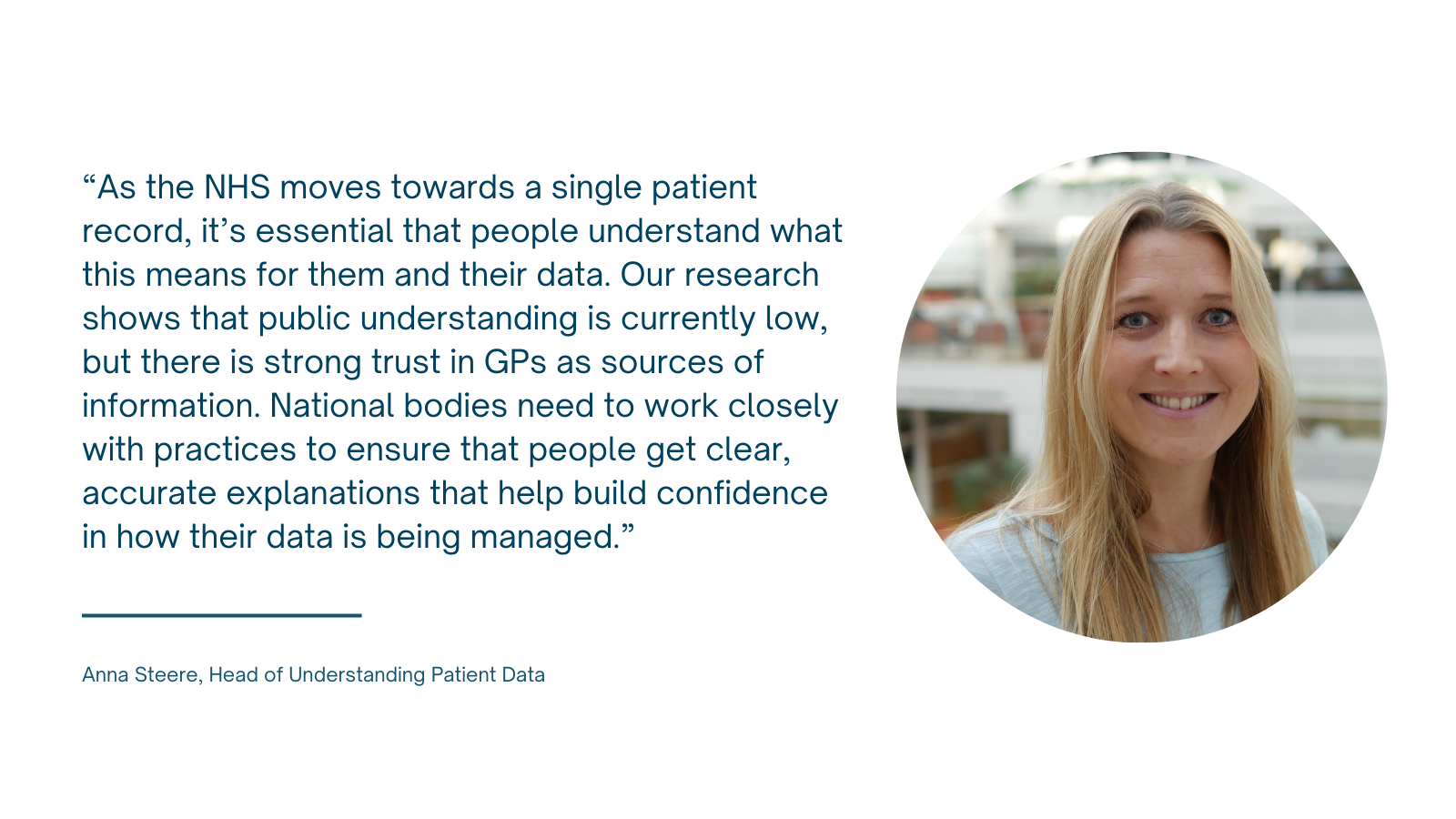By Emma Lagerstedt, Policy and Engagement Manager
“I would want to know what sort of bodies [can access information from my GP record] and what they’re going to be doing with my data.”
“There should be a centralised record, and then, depending on the needs of that department or provider or whatever, they should be able to access different levels within that record.”
“I don't recall anything. This probably sounds really bad. If I did, I probably didn't even pay any attention to it … there has occasionally been a few letters that have come through the post from the GP, and if they're not something of importance, I probably haven't even read them.”
- Quotes from focus group and workshop participants
Today, Understanding Patient Data is publishing a new report on the views of members of the public about the data held in their General Practice (GP) record, and what information they would like to receive about this topic.
We worked in collaboration with Qa Research who delivered an online survey, focus groups and co-creation workshops along with phone and face to face interviews with a representative sample of members of the general public across England to understand their perspectives on the data in their GP records.
The report provides the first exploration of information needs and communication preferences specifically regarding GP record data, and builds on existing literature with more in-depth evidence about views on trust in GPs to manage data. Our research lends support to the creation of a single patient record, with GPs positioned as the primary source of information about how patient data is managed, used and shared.
Why did we undertake this research?
GP records are often considered the most comprehensive source of health information, and can provide vital insights for both individual care and secondary purposes such as research. However, the topic has been subject to high-profile debate in recent years, and past attempts to centralise GP data have faced resistance from campaigners, clinicians and members of the public. This history underscores the need to understand public opinion on GP record data, and to understand their information needs to support effective communication about people’s records.
About the Research
Qa Research conducted a three-part study:
- Online Survey: A nationally representative survey of 1,004 people.
- Focus Groups and Interviews: Six focus groups and five telephone interviews.
- Co-design Workshops and Interviews: Three workshops and three in-person interviews.
What did we find out?
- Current awareness and understanding of how NHS records are managed is low. 61% of people surveyed already believe a single national patient record exists, and 57% do not recall receiving information about the data held in their GP record.
- Mixed views on decision-making suggest the need for clear communication about how data is managed. Given a binary choice, 61% of people stated they would prefer a nationally-controlled single patient record over a GP record managed by GP surgeries. However, GPs were perceived as the most trusted to make decisions about patient data. This apparent contradiction – higher trust in GPs but a preference for a nationally controlled record – highlights the importance of clear communication to align public expectations with practice.
- 78% would prefer information about their GP record to come from GPs, highlighting the importance of supporting practices in delivering consistent messaging. When prompted, this was reported to be based on personal relationships with patients and high levels of trust in GPs generally. As members of the public would expect to look to GPs for information about this topic, any changes to the way GP data is used or managed should involve national organisations supporting and empowering GPs to ensure they are equipped to explain these to patients.
- People value transparency about GP data, but think information about to their own record is the most important. 81% of people think it is ‘very’ or ‘somewhat’ important to be able to see their own GP record, but only 56% said they had seen their record. Most wanted information about the topic to be minimal and focused on key topics that were considered personally relevant – how to access records, who can see their data, and how it is protected – with more information available on request.
UPD will be taking the findings of the research forward to support conversations with the public about GP record data, and will be exploring how we can draw on these insights to provide accessible information on this topic.
For more information about the project and our recommendations for policymaking, visit our web page here and for more detailed insights, download the full report.



